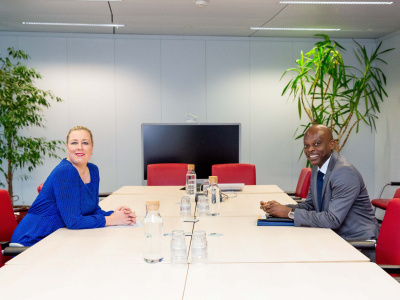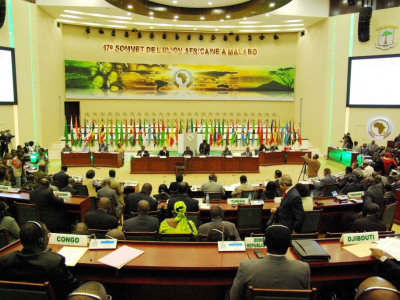
Who’s interested in the EU’s open invitation to join a post-Cotonou Agreement?
The negotiations for the successor to the Cotonou Partnership Agreement (CPA) are ongoing and, this spring, chief negotiators will likely meet again. They may then also discuss whether to encourage third states to join a future partnership. The European Union, at first sight, seems to favour the idea, but we ask ourselves: would any state be really interested in even considering the invitation?
The EU negotiating directives propose an agreement that could welcome ‘third countries which subscribe to the same values, contribute to meeting the objectives and share the same interests’ to become part of a post-Cotonou Agreement. This moves away from the language of the current Agreement, which restricts accession either to EU member states or to states ‘whose structural characteristics and economic and social situation are comparable to those of the African, Caribbean and Pacific (ACP) states’. No such limitations are imposed in the EU’s current mandate.
The ACP negotiating mandate does not echo the open invitation of the EU mandate. It does not mention any third country involvement. It emphasises, on the contrary, that the parties to the agreement are individual states of the African, Caribbean and Pacific (ACP) group and EU member states (paragraph 163).
In an explanatory memorandum, the European Commission underlines that its open, unilateral invitation “is particularly relevant, for instance, to allow strengthening the ‘Africa as one’ approach”. Yet, despite wider discussions on the merits of, and on the diplomatic framework for, a continent-to-continent approach following hints in this sense from both the African Union and the EU, North African countries are showing little enthusiasm for joining a post-Cotonou Agreement. They consider it a neo-colonial framework that is outdated and potentially damaging for their current privileged treatment in their bilateral relations with the EU.
How dynamics behind ongoing negotiations may affect the appetite for the EU’s invitation
The proposal to open the partnership is part of the direction in which the EU has been trying to push the negotiations. The EU’s mandate adopts a hybrid approach to the future partnership, which would maintain the basic features of the ACP-EU partnership in a ‘foundation agreement’ while shifting the weight of the partnership towards regional partnership ‘pillars’. The African regional pillar would contain the key components of the continent-to-continent partnership between the EU and AU, as this infographic from the European Commission suggests.
This would bring the EU’s partnership with the AU, based on the 2007 Joint Africa-EU Strategy, and the post-Cotonou partnership together. Yet this move is more than a technicality because the two frameworks rely on different partners and embody a fundamentally different approach to cooperation as explained in a recent ECDPM publication.
To break the impasse, last year the AU called on the EU and African members of the ACP to negotiate a new cooperation agreement “separated from the ACP context and based on a strong and sustainable continent-to-continent partnership that revolves around the AU and the EU”. Despite that call, the EU and the ACP countries initiated in September negotiations for a ‘foundation agreement’ in the ACP-EU setting. The question of the overarching or prevailing ‘diplomatic chapeau’ thus remains unresolved and the negotiations could well incur significant delays.
An opportunity for the UK to be closely involved in Europe-Africa affairs?
In spite of the unresolved questions making it even less attractive to be involved in the post-Cotonou agreement, in principle, non-EU members could envisage being associated with it in one way or another. We are not aware of any clear interest by countries such as Switzerland, Norway, Australia or New Zealand. We do not know whether the UK may be, but it is a special case worth mentioning.
Even if the UK leaves the EU, it will still be legally obliged, by virtue of its own laws (as long as they stand), to spend 0.7% of its national income to development aid. As the UK considers scaling up aid and sees to its strategic interests -including in Africa and especially the Sahel- it could consider accepting the EU’s open invitation.
This invitation is unconditional and, at least on paper, does not depend on how and if the country will leave the European Union. But it is not an ‘opt in’: in practice, much will depend on (a) how much the UK is willing to put on the table and (b) what it requires in return.
UK contributions would address the concern voiced in the ACP negotiating mandate, namely the “loss of the UK’s contribution”. Also the EU would expect the UK to continue to contribute.
The UK is in favour of integrating the separate ACP-specific European Development Fund into the next EU long-term budget under the proposed Neighbourhood, Development and International Cooperation Instrument (NDICI). The type of influence the UK is looking for if it continues to contribute financially may trigger many questions, and the EU is wary of setting any precedents for the UK that could be applied to other areas of the EU budget. The UK’s potential interest to be associated with the post-Cotonou framework would be to retain some insight in, and influence over, the EU’s priorities (and money) in the ACP regions.
If offer and demand match, direct involvement in a post-Cotonou agreement could go a step further than what the draft UK-EU Political Declaration (art. 108-109) in the wake of Brexit allows for. Whether being part of a post-Cotonou agreement is the most efficient, straightforward or only way of achieving this, remains however questionable.
An open EU invitation – but to what, exactly?
The explanatory memorandum shows that the EU has an interest in keeping the partnership “open to different degrees to the involvement or adhesion of other countries”. It remains silent about the modalities though, which clearly can go beyond the observer status. There are indeed various ways to be associated with an ACP-EU partnership, as the South African precedent highlights.
South Africa became a qualified member of the ACP and is not a party to the economic and trade chapters (Protocol 3 to the Agreement). This formula enables South Africa to maintain close ties with 79 countries of the ACP Group and offers other advantages such as access to tenders and institutional representation.
In sum, the EU has issued an open invitation but does not know yet what for. As long as there is no clarity on the question of African representation and AU involvement in the post-Cotonou negotiations, and what the future agreement will look like, it is unlikely that anyone will jump on the invitation. If the new partnership resembles the CPA too much, North African countries will prefer to keep their bilateral privileges with the EU. Some African countries and the AU may then also object to the CPA becoming the overarching diplomatic chapeau.
For non-EU donor countries to show up to the party, the offer would need to be clearer. In the meantime, for the UK, the open invitation is a card they could use later in the game, on the assumption they will effectively leave the EU. Yet even if concluding the post-Cotonou Agreement suffers delays, this still may not happen late enough for complete clarity on the UK’s future relationship with the EU – which, in turn, will inform the UK’s interest in joining a post-Cotonou Agreement, and the EU’s willingness to entertain it. The ACP too must see an added value in the UK’s association with the CPA.
Regardless of these dynamics, the ACP-EU partnership is far from being the only venue for the UK or any other country to continue to cooperate with the EU in Africa and in other regions – and many third countries may not consider the EU’s open invitation to be the most attractive path to engage with it in the near future. But any invitation is worth at least considering.
The views expressed are those of the authors and not necessarily those of ECDPM.



